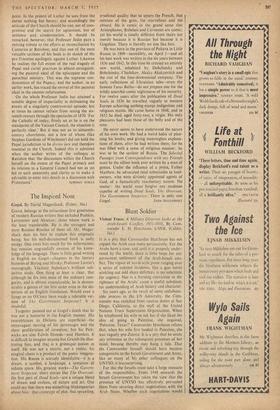The Inspired Nose
Gogol. By aivid Magarshack. (Faber, 36s.)
G000L belongs to the miraculous first generation of modern Russian writers that included Pushkin, Lermontov and Aksakov; those whose work is the least translatable. He is the strangest and most Russian Russian of them all. Mr. Magar- shack does his best to explain this enigmatic being, but his well-documented book is sadly stodgy. One owes him much for his information, but remains ungratefully envious of his know- ledge of the language. There is little good writing in English on Gogol--chapters in the literary histories of Baring and Mirsky; Professor Lavrin's monograph; Vladimir Nabokov's brilliant sub- jective study. One thing at least is clear, that although he fits into none of the ordinary cate- gories, and is almost unanalysable, he is demon- strably a genius of the first order even in the dis- tortion of an English 'translation. Would even a Synge or an O'Casey have made a tolerable ver- sion of The Government Inspector? It is doubtful.
Turgenev pointed out at Gogol's death that he Was not a humorist in the English manner. His resemblances to Dickens are superficial—the extravagant naming of his personages and the sheer proliferation of invention; but his Pick- wicks are also Edwin Droods—and Hamlets. It is difficult to imagine anyone but Grandville illus- trating him, and that is a grotesque notion in itself. He was not a satirist, not a realist; his magical chaos is a product of the poetic imagina- tion, His Russia is scarcely identifiable—it is dream, a symbol, a landscape, a sensation of infinite space. His greatest works—The Govern- ment Inspector, short stories like The Overcoat, the first .part of Dead Souls—are a unique blend of dream and realism, of nature and art. One could say that there was something Shakespearian about him : that contempt of plot, that sprawling,
irrational quality that so upsets the French, that mixture of the grim, the marvellous and the absurd. He is comic in the grand sense that Aristophanes, Rabelais and Cervantes are comic; yet his world is totally different from theirs not merely because it is Russian but because it is Gogolian. There is literally no one like him.
He was born in the province of Poltava in Little Russia in 1809—incredibly, on April 1—and all his best work was written in the six years between 1836 and 1842. In this timelie created an entirely new world, inhabited by Dobchinsky and Bobchinsky, Chichikov, Akaky Akakyevitch and the rest of the four-dimensional company. The early collections of Ukrainian tales—even the famous Taras Bulba—do not prepare one for the wildly anarchic comic nightmares of his maturity. For twelve years after the publication of Dead Souls in 1836 he travelled vaguely in western Europe achieving nothing except indigestion and religious mania. He came home in 1848, and in 1852 he died, aged forty-two, a virgin. His only pleasures had been those of the belly and of the nose.
He never seems to have understood the nature of his own work. He had a weird habit of plan- ning his books, and giving meaningless explana- tions of them, after he had written them; for he was filled with a sense of religious mission : he was to be the saviour of Russia. The Selected Passages from Correspondence with my Friends must be the silliest book ever written by a man of genius. Under the influence of a priest, Father Matthew, he advocated total submission to land- owners, who were divinely appointed agents of God, of a fantastically reactionary nature, No matter : the world must forgive any madman capable of writing Dead Souls, The Overcoat, The Government inspector. There is only one


































 Previous page
Previous page